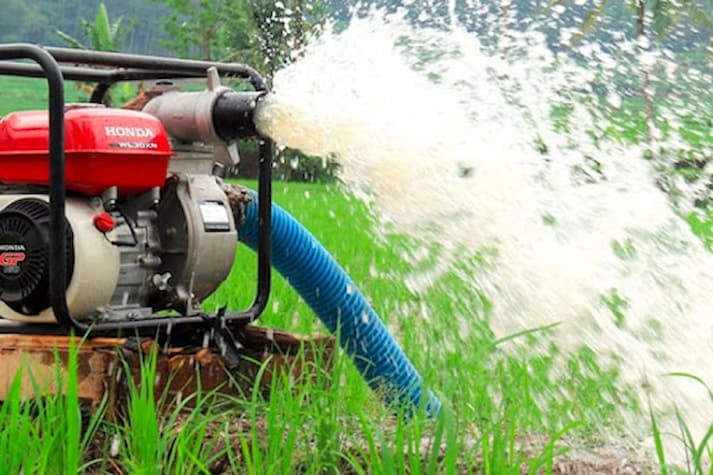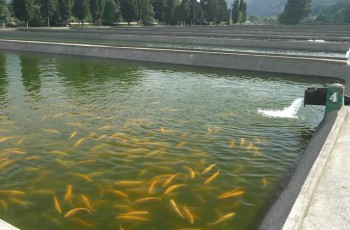20 Ways to Make Soil Even More Fertile
26 December 2023
 How to create fertile soil is the key to achieving abundant and high-quality agricultural yields? Soil fertility affects plant growth and forms the foundation for a healthy and productive agricultural ecosystem.
How to create fertile soil is the key to achieving abundant and high-quality agricultural yields? Soil fertility affects plant growth and forms the foundation for a healthy and productive agricultural ecosystem.
A deep understanding of effective practices and appropriate methods is required to maintain and enhance soil fertility. Understanding how to create fertile soil involves more than just introducing the essential nutrients plants need. Are Sobat Honda curious about various ways to create fertile soil? Find the information below.
20 Ways to Make Soil More Fertile
To achieve bountiful harvests and maintain soil fertility, it's crucial to remember that developing sustainable farming strategies is paramount. Concrete steps need to be taken wisely to reach this goal. Here are 20 ways that Sobat Honda can adopt to make the soil more fertile:
Read Also: Groundwater: Definition, Benefits, And Types
1. Understanding Soil Composition
Understanding soil composition is the crucial first step in improving soil fertility. Each soil has a unique composition of various mineral and organic elements. This understanding aids Sobat Honda in determining the most effective improvement strategies.
In analyzing soil composition, consider three main components: sand, silt, and clay. Sandy soil tends to have good drainage but lacks nutrient content. Clay soil retains water but can become compacted and challenging to work with.
2. Analyzing Soil pH
Equally important is analyzing soil pH. pH measures the level of acidity or alkalinity in the soil. The ideal pH range for soil varies between 6 to 7.5. Plants will struggle to absorb nutrients if the pH is too low (acidic) or too high (alkaline).
It's important to note that different plants have varying pH preferences. Some plants prefer acidic soil, while others require a more alkaline environment. Analyzing soil pH provides vital information for adjusting soil conditions to suit the type of plants to be grown.
3. Application of Organic Fertilizers
Organic fertilizers are a key aspect of naturally maintaining soil fertility. Compost, manure, and other organic materials stimulate soil microbe activity, improve soil structure, and supply necessary nutrients.
Sobat Honda can create compost using kitchen and garden waste or obtain it locally. Using organic fertilizers benefits soil fertility by gradually releasing nutrients into the soil, providing long-term support for plant growth.
4. Crop Rotation
Crop rotation is an intelligent tactic for maintaining soil fertility. Different plants extract different nutrients from the soil. By rotating plant types each season, Sobat Honda avoids depleting specific nutrients and diminishing soil quality.
Furthermore, crop rotation helps reduce the risk of pest and disease attacks targeting specific plants. Thus, crop rotation strengthens the farming system and gives the soil time to recover.
5. Use of Manure Fertilizers
Manure fertilizers are a beneficial natural nutrient source for plants. Animal waste contains essential elements like nitrogen, phosphorus, and potassium, crucial for plant growth. However, the use of manure should be balanced. The nutrient content and C/N (carbon/nitrogen) ratio should be appropriate to avoid disturbing soil microbe balance. Sobat Honda can utilize locally sourced animal waste like cow or chicken manure to create quality manure fertilizer.
6. Proper Irrigation
Appropriate irrigation is a significant factor in maintaining soil moisture. Water is a vital nutrient for plants, and dry soil can hinder root growth and stress plants.
However, avoid over-watering or under-watering as overly wet soil can lead to root rot and plant death. Conversely, excessively dry soil can hinder nutrient absorption. Use a soil moisture scale to gauge water needs and ensure proper irrigation.
7. Weed Control
Weeds are primary competitors for plants in terms of nutrients and space. If left to grow freely, weeds can harm growing plants by consuming nutrients and sunlight that the plants should receive.
Therefore, Sobat Honda needs to perform regular weed control. This can be done by manually pulling weeds or using mulching techniques. Weed control helps keep plants healthy and prevents unnecessary competition for nutrients and resources.
Read Also: 8 Characteristics Of Fertile Soil For Plants
8. Mulching
As mentioned earlier, mulching is a beneficial technique that helps maintain soil moisture and prevent erosion. Mulch, such as straw, dry leaves, or other organic materials, forms a protective layer over the soil.
But that's not all—mulch also helps stabilize soil temperature, reduce water evaporation, and prevent weed growth. Over time, mulch decomposes and adds nutrients to the soil.
9. Creating Irrigation Paths
Efficient irrigation significantly contributes to soil fertility and healthy plant growth. Sobat Honda can design irrigation paths matching the land's topography and the cultivated plants. To ensure sufficient water supply to fields or plantations, reliable water pumps from Honda Power should be used.
Depending on needs and preferences, Irrigation options include drip, trench, or surface irrigation. Sobat Honda, properly managing irrigation can helps avoid excess or insufficient water conditions that can disrupt the nutrient balance in the soil.
10. Soil Conservation
Soil conservation encompasses measures taken to protect soil from erosion and degradation. Degraded soil tends to have poor structure, low nutrient content, and disrupted water retention capabilities.
To implement soil conservation, Sobat Honda can take various steps such as terrace construction, ground cover planting, or agroforestry systems. These actions help maintain long-term soil fertility and prevent environmental damage.
11. Use of NPK Fertilizers
NPK fertilizers contain three primary nutrients: nitrogen (N), phosphorus (P), and potassium (K). These three elements are essential for plant growth. Nitrogen supports leaf and stem growth, phosphorus is crucial for root development and flower formation, and potassium plays a role in water balance and plant metabolism.
Sobat Honda can use NPK fertilizers at recommended doses for the cultivated plants. Knowledge of plant nutrient requirements and following correct fertilizer usage guidelines is essential.
12. Vermicompost Utilization
Vermicompost is an organic fertilizer produced through the activity of earthworms. Earthworms aid in breaking down organic matter into smaller particles, making it easier for plants to absorb. Vermicompost contains higher nutrients compared to regular compost and also improves soil structure.
13. Use of Biofertilizers
Biofertilizers or soil microbes are microscopic organisms that live in the soil and play a vital role in the nutrient cycle. These microbes help break down organic matter into nutrients that plants can absorb.
Applying biofertilizers to the soil enhances microbe activity. This helps improve soil quality and nutrient availability for plants. Biofertilizers are generally available in powder or liquid forms that can be mixed into the soil or sprayed onto plants.
14. Use the Best Farming Tools
Selecting and using appropriate farming tools can significantly impact work efficiency, productivity, and soil quality. Using the right tools simplifies the farming process, minimizes soil damage, and reduces workload.
Sobat Honda needs to research and choose the most suitable farming tools based on their needs. Opt for devices designed specifically for the type of crops and land owned. Some necessary tools Sobat Honda needs include tractors and water pumps. To ensure the proper and reliable tools are used, utilize tractors and water pumps from Honda Power Products.
15. Legume Planting
Planting legumes, such as beans and soybeans, can enhance soil fertility through nitrogen fixation. Leguminous plants have a symbiotic relationship with Rhizobium bacteria, capable of extracting nitrogen from the air and converting it into a form absorbable by plants.
Sobat Honda can rotate legume crops with other crops to naturally add nitrogen to the soil and reduce reliance on synthetic nitrogen fertilizers. This also promotes sustainable farming practices.
16. Creating Waste Flow Paths
Creating effective waste flow paths can reduce the negative impact of waste on the environment, preventing soil and water contamination. First, Sobat Honda needs to identify the types of agricultural waste generated, such as crop residues, leftover fertilizers, or agricultural chemicals. Each type of waste should be managed appropriately to avoid environmental or soil damage.
The next step is designing efficient waste flow paths. Create channels or containment systems that direct waste from the agricultural area to a safe and suitable location. For instance, organic waste can be turned into compost or used as raw material for biogas.
17. Implementing Intercropping Techniques
Intercropping, or planting different crops on the same land simultaneously, has multiple benefits, including efficient space use, reduced pest and disease risk, and increased soil fertility.
Sobat Honda can optimize soil resources and nutrients more effectively by planting different crops. Certain crops may also provide protection against specific pests or diseases for other plants.
18. Maintaining Land Cleanliness
Maintaining cleanliness on agricultural land significantly impacts soil fertility. Leftover plant material can become breeding grounds for pests and diseases.
After harvest, remove harvested plant residues and clean the area of dry leaves or decomposed organic matter. This step helps prevent pest and disease spread and maintains soil quality.
19. Use of Natural Leaf Fertilizers
Natural leaf fertilizers are a beneficial alternative for providing additional nutrients to plants. For example, soaking leaves from guava or papaya contains essential nutrients that plants can absorb through their leaf surfaces.
This soaked solution can then be used for watering or spraying onto plants. Natural leaf fertilizers offer extra nutrients and assistance when plants need an additional boost.
20. Regular Monitoring and Care
Lastly, regular monitoring and care of the soil and plants are essential. Observing plant development helps Sobat Honda detect issues early, such as signs of nutrient deficiency or pest attacks.
Regular care includes pruning, fertilizing, and soil condition monitoring. Sobat Honda can maintain soil fertility and support optimal plant growth by consistently caring for plants.
So, now that Sobat Honda has a better understanding of how to create fertile soil, it's important to remember that this process requires patience and may take some time. However, in the end, Sobat Honda can have ready-to-plant ground and achieve more perfect harvest results.
With the advancement of technology and innovation, agricultural tools have also progressed. Many advanced tools can make Sobat Honda's agricultural land management more efficient, especially in water supply.
To support Sobat Honda's efforts, consider using quality water pumps from Honda Power Products. With advanced technology and reliable performance, the Water Pump-WB30XN NF from Honda Power ensures optimal water supply for Sobat Honda's agriculture.
Use Honda Power Products to ease irrigation management, maintain soil moisture, and ensure healthy plant growth. Visit now!

Honda Power Products Indonesia
Honda Power Products menyediakan mesin serbaguna, generator, pemotong rumput, pemotong sikat, pompa air, dan mesin tempel.



